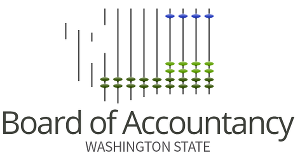Complaints
Authority over CPAs
We regulate Certified Public Accountants (CPAs) and certain credential holders in Washington State. We have authority over:
- CPA and CPA firms: People and firms licensed to use the title “CPA” and perform attest services.
- CPA-Inactive certificateholders: People that can use the title “CPA-Inactive.”
- CPA applicants: People qualifying for, or applying for, a CPA license.
- Non-CPA owners of CPA firms: A non-CPA who holds ownership in a CPA firm.
Authority over non-CPAs
A CPA license is not required to provide accounting, bookkeeping, or tax services. If someone does not hold out as a CPA and does not offer attest services, please contact the Attorney General's Office, the IRS, or an attorney.
Complaints Investigated
Some common complaints that we investigate are:
- Negligence in the preparation of financial statements or records: A CPA that was negligent in performing public accounting (AICPA Code of Professional Conduct 1.400.040).
- Failure to return client records: Within 45 days of a written request, CPAs must provide original records that belong to the client, and client records prepared by the CPA (AICPA Code of Professional Conduct 1.400.200), and may retain copies. A CPA does not have to provide incomplete work, working papers, or records already provided. They may charge a fee to gather records and require payment before providing the records.
If you are seeking records from your CPA, we recommend sending your request by certified mail to your CPA, and list specific records. If your CPA does not return your records within 45 days, and they are required to provide the specific records that you asked for, you may file a complaint. Please include a copy of the request that you sent to your CPA.
The Board cannot compel a CPA to provide records as the result of a complaint. You may wish to consult with an attorney if you are having difficulties retrieving records. - Integrity and objectivity: CPAs must follow the integrity and objectivity rule (AICPA Code of Professional Conduct 1.100.001 and AICPA Code of Professional Conduct 1.100.005).
- CPA title use by non-CPA accountants, bookkeepers, or firms: Someone using the title “CPA” without an active CPA license is prohibited (RCW 18.04.345).
Complaints Not Investigated
We cannot resolve fee disputes, damages, disputes over tax code interpretation, or other claims.
- Fee disputes: We do not have authority over fee disputes. Fee disputes include differences over fees, billing amounts, timings for billings, requiring for payment before further work, and requests for itemized billing.
- Complaints currently under litigation: If the complaint is currently in litigation or review by another agency, then we may wait until the review is complete.
- Complaints against non-CPAs: We do not have authority over non-CPAs, unless they are using the title “CPA” or performing attest services. For complaints against non-CPAs, contact the Attorney General's Office.
- Frustrating matters that to do not violate professional standards: Some situations may create frustration for a client but do not violate professional standards. This includes but is not limited to slow or non-existent communications for status updates, billing practices, failure to provide itemized billing, and rude behavior.
For complaints that we cannot investigate, you may wish to contact the Attorney General’s Office, the IRS, or an attorney.
What to Expect
The Board is required to comply with the Public Records Act, Chapter 42.56 RCW. All information that you submit to the Board, including your name, complaint, and documentation, is subject to public disclosure.
All complaints follow WAC 4-30-140. You will receive a letter when we close the complaint.
A disagreement or an honest mistake may not be a violation.
If there is sufficient evidence of a violation, we may issue a statement of charges and hold an administrative hearing. We can impose the following sanctions for violations of the Public Accountancy Act:
- Revoke, suspend, or refuse to renew or issue a CPA license.
- Require additional continuing professional education (CPE).
- Impose a fine paid to the state of Washington.
What Not to Expect
As a result of a complaint, you will not receive money, have records provided to you, or have the CPA ordered to perform services. You may wish to separately seek personal recourse.
We cannot give updates or estimate when a complaint will be closed. Once we close the complaint, we will let you know the results.
Filing a Complaint
To file a complaint, you must complete our online complaint form. We cannot take complaints by mail, email, or phone.
On the online complaint form, please explain the exact nature of your complaint and allegation. We must have both sufficient documentation and a violation of professional standards to determine if there was a violation. For us to review your complaint, please cite your alleged violation from professional standards in your complaint:
If we do not have authority over your complaint, or your allegation is not a violation of professional standards, then we will close your complaint.
Complaint Form (Opens in new window)
We may ask for more information during the investigation. Once we close the complaint, we will let you know the results. If the Board imposed discipline, then we will provide you with a copy.
Contact Us
If you have questions, please contact us at investigations@acb.wa.gov or (360) 664-9266.




